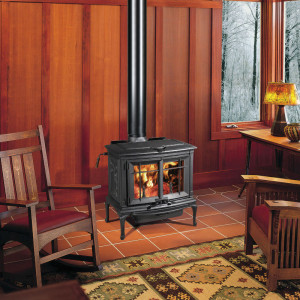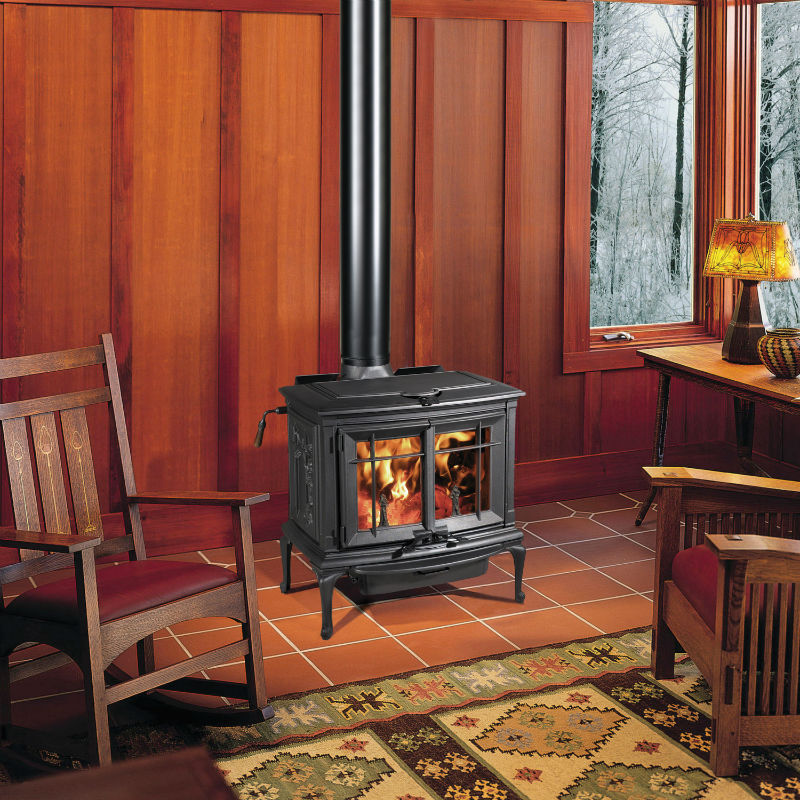 As you make the decision of what type of fireplace you want, take your needs and your own capacities for fueling into consideration. Sometimes a backyard fire pit or open-hearth barbecue can satiate your desire. Especially during brisk fall or winter nights, the allure of dancing flames, a chorus of crackling sounds and a nice woodsy aroma are all that are needed to bring back fond family memories and/or build new ones. However, whether indoors or out, there are some practical advantages and drawbacks to wood-, pellet- and gas-fueled fireplaces. Keep reading to determine which is right for you!
As you make the decision of what type of fireplace you want, take your needs and your own capacities for fueling into consideration. Sometimes a backyard fire pit or open-hearth barbecue can satiate your desire. Especially during brisk fall or winter nights, the allure of dancing flames, a chorus of crackling sounds and a nice woodsy aroma are all that are needed to bring back fond family memories and/or build new ones. However, whether indoors or out, there are some practical advantages and drawbacks to wood-, pellet- and gas-fueled fireplaces. Keep reading to determine which is right for you!
WOOD-BURNING FIREPLACES
The main advantage to a wood-burning fireplace or an outdoor fire pit is the ambiance it creates. Since wood is the original renewable fuel, all the positives that go with a green/conservationist perspective come into play for some homebuyers. And with advanced fireplace technology, you can reduce gas emissions, increase the circulation of heat in indoor versions, or help warm both family members and guests alike on those colder evenings.
The disadvantages to a wood-burning fireplace are fairly straightforward. A certain degree of vigilance is always needed to keep the embers safely where they belong. Cleaning up ashes and soot is an uninspiring pastime, and it’s even less enjoyable when accidental spills spread the mess. Then there is the annual need to keep the chimney clear and clean, not to mention the annual task of finding the fuel—either chopping wood or paying for it to be delivered. Additional hassles can surface if there are problems starting the fire or keeping it going. There is also some evidence to indicate that particles generated from wood burning can be harmful to one’s health as well as the environment.
GAS-FUELED FIREPLACES
The main advantage of gas fireplaces for some homeowners is how easy they are to turn on and off. Instead of matches, newspaper, kindling, and close attention, starting many of these units can be as simple as flipping a switch. Cleanup? Ha! Nor is there a need to religiously tend to the fire. Most gas fireplaces have non-burning displays that resemble wood logs, and burners that conserve fuel by getting the most visual appeal through well-designed flame spreaders.
For many people, the main disadvantage of a gas fireplace is that there is no roaring fire, wood smell or crackling of a dancing flame. For environmentalists, gas fireplaces deplete a non-renewable resource. While it’s not necessary to carry logs to an outdoor gas fire pit, the gas tank must be refilled (or possibly a gas line run to the unit from a larger, stationary tank).
PELLET STOVES
The main advantage of pellet stoves is the fact that they’re more convenient to operate and have much higher combustion and heating efficiencies than ordinary wood stoves and/or fireplaces. A benefit of this: they produce very little in the way of air pollution. In fact, pellet stoves are the cleanest solid fuel burning residential heating appliances; with combustion efficiencies ranging from 78-85%, they are exempt from the EPA’s smoke-emission testing requirements. Their heating capacities can range anywhere between 8,000 and 90,000 Btu per hour, making them suitable for homes, apartments and condominiums.
The main disadvantage of pellet stoves (if you can call it a disadvantage) is their relative newness to the market in comparison to their gas- and wood-fired counterparts. Operator error accounts for more service calls than equipment failure. It’s very important to follow the manufacturer’s operating and maintenance instructions, which can reduce the likelihood of damage to the appliance (e.g. most manufacturers recommend removing unused pellets from the stove at the end of the heating season). This can minimize difficulties in lighting the appliance at the start of subsequent heating seasons. Having the flue vent cleaned and inspected on a regular basis is another recommendation to prevent soot from building up.
Whether gas, pellet or wood burning, each option remains an attractive amenity to a considerable proportion of many homeowners. This is an area where, as always, you are encouraged to seek the assistance of an experienced professional. If you are considering a home remodel, be sure to weigh the long-term advantages and disadvantages to your choice as well. No matter which one you decide on, look forward to the addition of a fireplace to your home. Quality time spent around a roaring fire is usually the stuff of which long lasting memories are made. Give us a call at 800-876-6539 to speak with a team member or to request an appointment. We look forward to helping you keep your family and your home protected and warm for the long haul!

